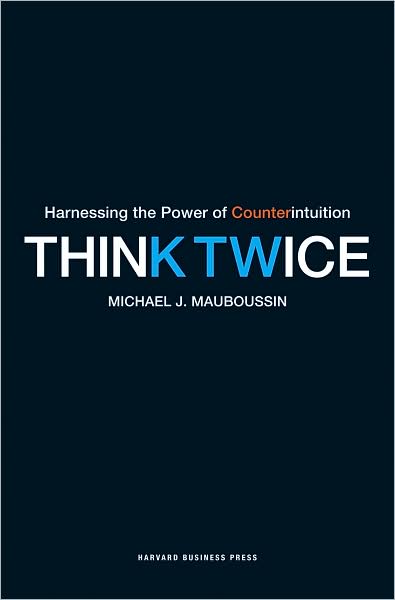Since I met him at a Baltimore CFA Society meeting in 2001, I have? appreciated the intelligence of Mike Mauboussin.? (My old boss was his roommate in college, so I was told, the name is pronounced “MOE-bus-son.”)? He was early to pick up on the value of behavioral economics and nonlinear dynamics (“chaos theory”).
Think Twice is an effort to get all decisionmakers to take a step back and ask whether they are making decisions from shorthand rules, or from carefully analyzed data.? The book is full of examples of how people are easily fooled by irrelevant data.? Most of the examples I was aware of, becauseI have studied this stuff intensively.? There were a few surprises for me, though.
Did you know that at the craps tables in Las Vegas, on average, when someone wants a higher number, they throw the dice hard, and when they want a low number, they give it a gentle toss?? I found that to be an amusing example of the illusion of control in? a case where humans have no control.
This book helps answer a number of tough questions:
- When are crowds better than experts, and vice-versa?
- Why don’t we go get data, rather than listening to anecdotes?
- Why does an initial estimate play such a large role in estimating the final value?? (Why don’t people ignore the estimates, and start from scratch?? It’s too much work!? Never underestimate the power of laziness.)
- Can subliminal cues lead people to make different decisions?
- Do I have to understand the whole system to understand the piece of the system that I am interested in?
- When can you outsource production, and when does it not make sense?
- When do catastrophic events occur, and why?
- How does one sort out happenstance (so-called “luck”) versus skill?
The clear message of the book is don’t be lazy; do your homework on any task.? Try to be objective as possible, ignoring the opinions of others, and using as much data and cold logic as one possesses to confront the problem.? Be aware of the mental shortcuts that hinder good decisonmaking.
I recommend this book, but with a quibble.? It is not written in a truly user-friendly way.? There are technical terms used and not defined that many average people will blink at, and maybe get part of the meaning through context, but not get it in full.? If we Flesch-tested the book, it would come up at “college level” for reading.? (As for me, I am to be understood at a high school level.)
Who can benefit from this book?? Anyone who makes economic decisions could benefit.? It would help them be more self aware of the pitfalls involved in decisionmaking.? I found it to be a breezy read at 143 pages of main text, and the writing style is entertaining.
You can buy the book here: Think Twice: Harnessing the Power of Counterintuition.
Full Disclosure: Anyone entering Amazon through a link on my site, and buying something — I get a small commission.? Your costs remain the same.
To my readers, if you want me to review Mauboussin’s other book, Expectations Investing, I would be more than happy to, because I read it five years ago.? If you have other books you would like me to review, let me know… my time is limited, but if I get a lot of people asking for the same book, I will give it a shot.
PS — look at the book cover — what is the hidden message? (which never gets mentioned once in the book…)


I for one would like to see a review of his other book.
it says thin ice on the cover
Yes, Jamie. When I looked at it, I first said to myself, “KTW? What could he mean by KTW?” Then I thought again and said, “Oh, Thin Ice. The blue letters don’t matter for the second meaning.”
I might have been a little more heavy handed, and written somewhere in the book: “Think Twice or You’re on Thin Ice.”
pwm — found my copy of “Expectations Investing.” Blew the dust off — there should be a review soon. I have a distinct opinion on this book.
I still vote for Dance of the Money Bees by John Train; I also enjoy Train’s interveiws as well. By the way david; I hope we can read your thoughts regarding Assurant when earnings come out in a few weeks. The Analyst community views all of these as a book value trade only from what i have found on the web. I don’t have access to either the Credit Suisse or Suntrust reports regardings AIZ, Met and some of the other insurers.
I would also be very interested in your review of Expectations Investing. It has been on my list to potentially read, and I’m curious if you think it adds another useful dimension to stock analysis.